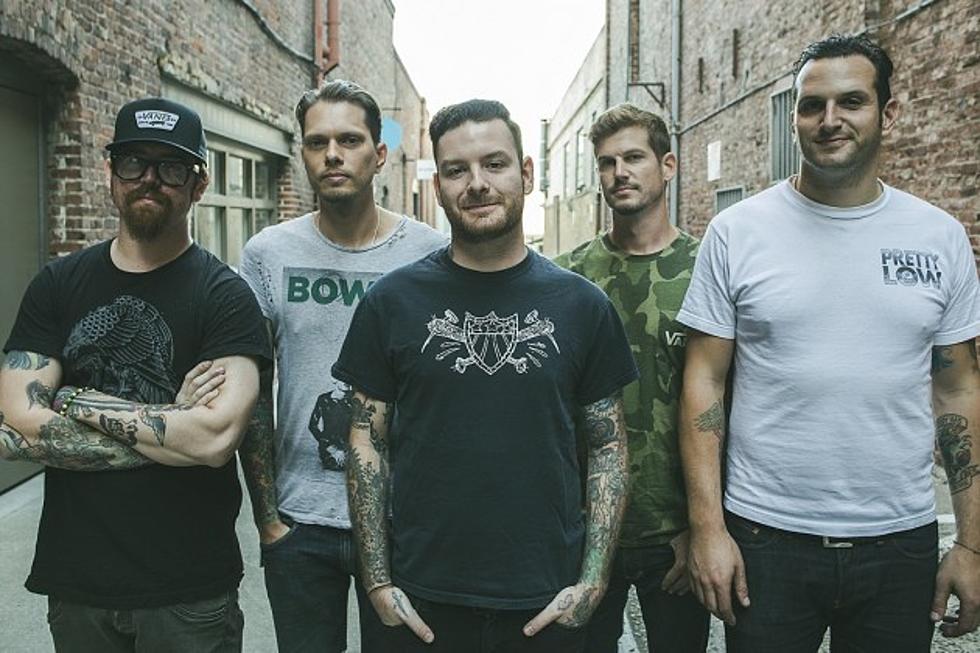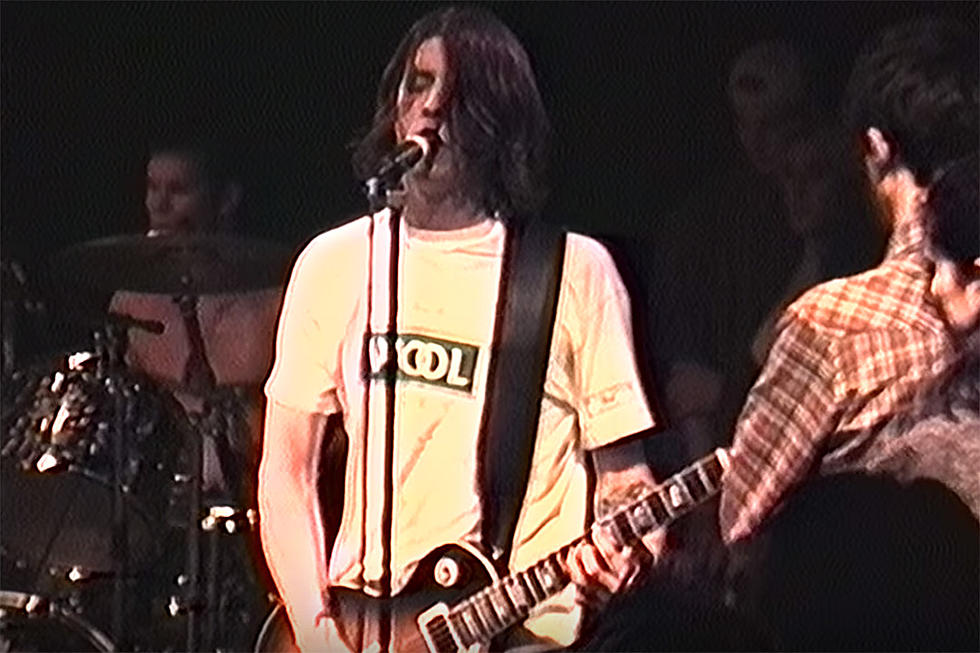
Senses Fail’s Buddy Nielsen Talks New Record, Identifying as ‘Queer’ + Why He Follows New Music
While New Jersey hardcore rockers Senses Fail have been identifying with the pop-emo scene of the early 2000s since their formation, they've always possessed a slightly harder edge than their counterparts. That edge is quite apparent in songs like "One Eight Seven" -- fading out with Buddy Nielsen intensely screaming, "I want to kill you," at the top of his lungs, repetitively.
If anything, that should have been a foreshadow for what was to come, but in the interim, they were responsible for pop-punk cult classics like "Can't Be Saved" (which you may have jammed out to on Guitar Hero) and "Calling All Cars."
Now, Senses Fail, as well as Nielsen -- the only remaining original member of the band -- have claimed a new identity in a way. With their last record, Renacer, they composed some of their most hardcore work to date, and now the band is gearing up for its follow-up, Pull the Thorns From Your Heart, due out June 30 via Pure Noise Records. Ahead of that date, we had the chance to catch up with Nielsen; check out our exclusive conversation below:
Is Senses Fail's new, harder edge your true musical identity? As in, is this how you've always wanted the band to sound like?
Me, personally, yeah. It changes though. Right now it’s the true identity and maybe 10 years ago it wasn’t. I wouldn’t say that any version is any better than the other, but our current sound reflects what kind of music I want to play and 10 years ago it suited the time I was at in my life.
What can your Let It Enfold You fans expect to hear on the new record?
Well, nothing that sounds like Let It Enfold You. [Laughs] I don't know, there’s singing on the record and songs that sound like Jimmy Eat World’s Clarity, but unless someone enjoys our change in sound, or if you’re looking for something that sounds like Let It Enfold You, you’re probably going to be disappointed. But you never know, people could like it. Honestly, I don’t really think too much about it because I don’t necessarily care too much since I can only deal with what’s present ... and what’s present is the music that we put out. It will find an audience. It’s not going to be the same people, but it might be some of the same people. Some people have liked everything we’ve done, and some people only liked Let It Enfold You. I would say that it’s probably more closely a follow-up to Renacer than really anything else. Those two records will fit together pretty nicely.
You recently identified yourself as "queer." What made it the right time for you to come out?
Well, I came out as “queer” which is a sort of ambiguous umbrella term. Basically, the way I identify is as “queer” which means that there’s no sexual identity that encapsulates me as a whole. There’s heterosexual, there’s homosexual and there’s bisexual. Heterosexual would mean there’s an exclusive interest in the opposite sex. Homosexual means an exclusive interest in the same sex. Bisexual would mean an equal interest in both, including sexual and romantic, because there’s a difference here. There are also people that are asexual that have romantic interest and being in a relationship with people but no sexual interest. Most relationships are much more than sex and so much of our inter-relational experiences are not based on sex, but there is a piece of a relationship that can be based on sex.
So, my way of identifying is because my romantic and sexual interests can shift with various agendas of people. I’ve learned that there is no way to accurately label my sexuality other than to say “queer.” It also represents the fluidity of it, because I’m engaged to a female and at times in my life I’ve not just had sexual relationships with females, but I’ve now chosen to have a committed relationship with a female. I don’t necessarily think that makes me exclusively heterosexual. It was all about finding a group of people that embraced the fluidity of gender and the fluidity of sexuality, because I never felt that I could fit in as a gay man because I never fully felt like that was my identity. I never felt bisexual either, because being bisexual is really difficult. It sort of leaves you in the middle and it’s a little complicated for a lot of people. It’s a little bit more welcoming when women are bisexual, but when men say that they’re bisexual you kind of get heat from both sides. It never really felt safe -- not that being “queer” feels more safe, but I was ready to claim that label with a support system that I have.
How do you think music and sexuality mix?
I would say that a lot of popular music is sold through sexuality or a perceived notion of sexuality. I mean, music is a sort of expression of the human psyche, and part of that psyche is sex. Part of what makes the human experience is, for a lot of people, sexuality. So I think they mix a lot. I think it happens, maybe not on purpose, but there’s always a piece of it sticking through somewhere if you look hard enough. It might not always be so overt but there’s a lot of it when you start to pay attention to it. Even in the way that there are more male-fronted bands in the punk scene than female-fronted bands. That has to do with sex as well, that has to do with gender, which can fall into that scope. So, yeah, I think it’s a pretty dominant thing. A lot of times when you see pop music performed it’s done in a very sexual way, so I think it’s very prevalent.
You announced in New York City a while back that it would be the last time you would play "One Eight Seven" ... and then ended up playing it again later on. Do you have a love/hate relationship with that song?
No, I just think it’s fun to mess around with it. It’s also a really old song. We have a lot of different fans and I would say about two-thirds of our fans don’t like that song or know it. There’s a lot of people that want to hear it, so we’ll play it, and usually only half of the crowd is really excited about it. It’s not that I dislike the song, it’s that although there are a lot of people who are vocal about wanting to hear it, the actual amount of people who are truly interested in it is much smaller than what you’d really think.
Certain other songs like “Can’t Be Saved” and “Calling All Cars,” even “Bite to Break Skin,” go over so much better than “One Eight Seven.” They are just songs that more people like, so we’ll play “One Eight Seven” every now and then when it makes sense for the people who want to hear it but we also have to remember that not everyone wants to hear it. Not everybody likes that song or that version of Senses Fail. Since we’ve been a band for so long, there’s various versions of Senses Fail. There are people who don’t like any of our old records, they only like Renacer and the newer stuff, so they come to a show and don’t want to hear any of the older s---, they just want to hear new stuff, so there’s lots of different viewpoints ... we just try and play a good mix of everything.
Do you think Drive-Thru Records would have signed you if you had approached them with Renacer?
[Laughs] No, not at all. We probably would have not been on Drive-Thru if we had approached them with Renacer -- very different styles for sure.
You work with and follow a lot of up-and-coming bands. What is the importance of supporting the new generation of punk and emo bands?
I would say I’m always interested in new music and I think it’s important for older bands to support younger bands. I also think it’s a benefit for us because if you want to play new music, if you want to be current and put out music that people in the music scene currently like, you also have to be educated on what is popular and what is doing well. You can’t just, as an older band, decide that everything new sucks and you don’t want to be a part of it, because then you end up not really gaining any new fans; you start playing music that’s sort of outdated and not necessarily very interesting. I think a lot of older bands suffer from that where they’re just not paying attention.
Sometimes you get older and you feel this sort of jaded, been-there-done-that kind of thing and you kind of lose hold of what is going on. I like to know what people are interested in and like so that when we go out on tour we bring bands that people like and are interested in. If we just brought out bands from the era that we’re from, there’d really be no bands to bring out.
Also, relying on other people’s opinions in the music industry is not very smart because people have their own agenda, so they push bands on you. You really have to have your own opinions about music and what you want to support. It’s good to know the varying degrees of what is out there so you can also know what to support and what not to support. If I wasn’t to pay attention and we took out a band that’s anti-LGBTQ, it would look really stupid. I think it’s really important for bands to pay attention to the scene that they belong to. I think it’s really difficult to make music in a scene that you’re not paying attention to -- it just seems really aloof. I’m not interested in being aloof, I want to be connected, and I also like a lot of the bands.
You can pre-order Senses Fail's upcoming LP, Pull the Thorns From Your Heart, at this location -- and make sure to stay up-to-date with everything happening in their world at their official website.
More From Diffuser.fm









